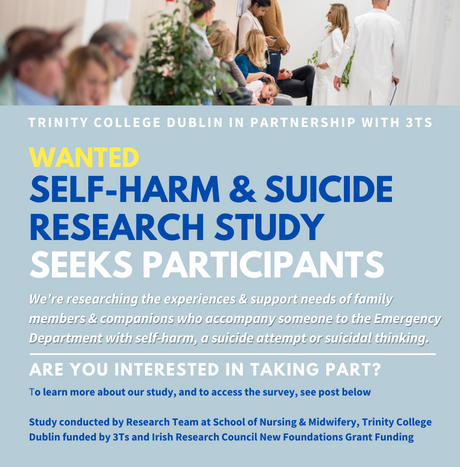Research Participants Wanted
17/06/2022
Now recruiting participants for research phase 2 "Accessing Help for Self-Harm & Suicidal Behaviour in ED - Families & Companions"
Research project funded by 3Ts and Irish Research Council "New Foundations" Grant Award
We are recruiting participants for Phase 2 of our research "Accessing Help for Self Harm & Suicidal Behaviour in the Emergency Department.
We're looking for volunteers aged 18 years +, who accompanied someone to the Emergency Department in the Republic of Ireland with self-harm, suicidal behaviour or a suicide attempt within the past 5 years and not more than 2 months ago. Volunteers will be asked to participate in our survey taking place over the course of this summer.
Follow-up to Phase 1 "Accessing Help for Self Harm & Suicidal Behaviour in the ED: Experiences of Service Users’
This is a follow on to Phase 1 which completed in 2020 and focused on the personal experiences of 50 participants who presented to the ED of hospitals throughout Ireland for self-harm or suicidal behaviour within the preceding 5 years. You can view or download the full Phase 1 Research Report by clicking on the image below.
-(1).png?Status=Master&sfvrsn=2a51bb77_1)
Phase 2 now invites families and companions to share their experiences of accompanying someone to the ED with self-harm, suicidal behaviours or an attempted suicide.
Who can participate in the study?
Our Phase 2 study is recruiting participants now. We are looking to hear from you if you are a family member/companion who accompanied a person to the Emergency Department following self-harm/suicide attempt or suicidal thinking. Family members can include any relation of the person while companions can include informal carers, professional carers, friends, or any person who accompanies someone to the ED. You must:
- be 18 years or over;
- have accompanied someone to the ED in the past 5 years but not within the previous 2 months;
- have accompanied someone to an ED in the Republic of Ireland.
What's the ask for Phase 2 Volunteers?
In this study we're looking to identify what experiences family members/companions have when they accompany someone to the ED with self-harm/suicidal behaviour. We're also looking to identify what the support needs of family members/companions are.
We're gathering this information via on anonymous, online exploratory survey. The survey comprises 30 questions in total - not every question will be relevant to every participant - and comprises a mix of short, closed questions, and more open-ended questions which provide more of an opportunity to describe your experiences.
We need you now!
If you would like to complete the survey, click here to be directed to an information sheet and then the survey.
PARTICIPATION IS ANONYMOUS
As the survey is anonymous, you will not be asked to provide your name. Any information provided in the responses that could be identifiable will be removed in the survey report.
ETHICAL APPROVAL
This study was granted ethical approval from the Research Ethics Committee of the Faculty of Health Sciences, Trinity College Dublin.
Phase 1 Key Findings & Recommendations
A key finding of Phase 1 was that there was a lot of variability in the experiences people had with many participants reporting poor experiences overall while a smaller group had mostly positive experiences.
Poor patient experiences often occurred because of a lack of understanding from ED staff around self-harm/suicidal ideation. This lack of understanding contributed to negative interactions and treatment including ‘labelling’ and treating the person as ‘different’ from those presenting with physical health problems. This created a sense of ‘otherness’ which stigmatised individuals and further compounded low self-esteem for some. Other negative aspects of care and treatment in the ED included mechanistic, ‘tick-box’ mental health assessments, a lack of information and onward referral at discharge and a lack of follow-up following discharge.
However, while negative experiences were not uncommon, there were some very positive experiences reported also where participants reported interacting with empathetic, skilled, and knowledgeable staff who included them and their families in the assessment and treatment process. These positive experiences were common when interacting with specialist mental health staff, although this was not exclusively the case.
Bring a companion
One of the key findings that also came from this study was around the issue of being accompanied or not to the ED. Approximately one-third of participants in this study did not have anyone with them when they presented to the ED. These participants generally found the experience more difficult and found the long waiting time, in an often noisy and chaotic environment, distressing and lonely and were consequently more inclined to leave the ED without being seen. Those who had people with them reported that it was often family members/friends who encouraged them to stay and be assessed and for the most part their presence in the ED was very valuable to them.
On discharge
However, it was also clear that family members/companions were often left unsupported by staff when they were in the ED and crucially also when the person was discharged home. Participants described how companions were sometimes not included in their assessment, despite this being an important aspect of the guidance around assessment of a person following self-harm or a suicide attempt in the ED. In other cases, participants reported how their family members were left to care for them at home while waiting on a referral to mental health services, with no information on how best to help and support their loved one in this difficult time. Consequently, a key recommendation that emerged from this was study was to engage in further research on the experiences and support needs of family members/companions who support someone presenting to the Emergency Department following self-harm/suicidal behaviour. Phase 2 of our emergency department research will focus on this topic.